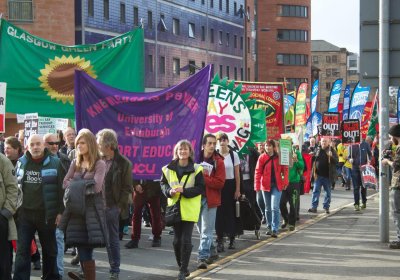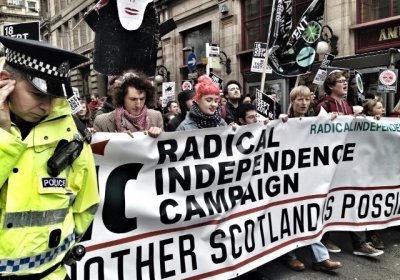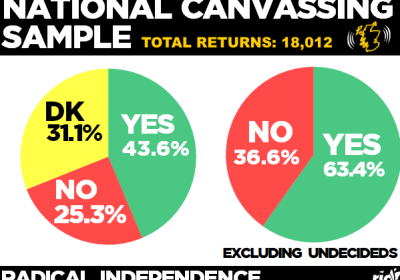Prime Minister David Cameron's Conservative Party won a clear victory in Britain's May 7 general elections. In Scotland, however, the Scottish National Party dramatically rose from six seats to 56 out of 59, in a clear sign of opposition to the brutal austerity backed by the major parties in Westminster.
Scotland
Britain's May 7 general election is set to be the closest in living memory.
In the polls, the two leading parties, Labour and the Conservatives (Tories), are within points of each other. The polls have not shifted despite the best efforts of Tory Prime Minister David Cameron and Labour leader Ed Miliband to secure a breakthrough.
Why are the polls so close?
The People’s Referendum: Why Scotland Will Never Be the Same Again
by Paul Geoghegan
Luath Press 2015
177 pages
The British-wide general election for the Westminster parliament scheduled for May 7 looks set to be very close, perhaps even closer than the 2010 election that resulted in the Labour Party being replaced by a Conservative Party-Liberal Democrat coalition government.
Opinion polls suggest that neither of the two main British parties, Conservative or Labour, will win enough seats for a majority of their own in the House of Commons.
Disunited Kingdom: How Westminster Won a Referendum But Lost Scotland
By Iain MacWhirter
Cargo Publishing, 2014,
174 pages
The independence referendum on September 18 last year has been hailed by many as the most important event in the recent Scottish history.
The result was far closer than any supporter of independence would have dared predict even a few months before the vote. About 1.6 million voters (45%) refused to be swayed by a sustained fear campaign by the British state and its allies ― voting “Yes” to Scottish independence.
As Scots gathered together at Christmas and Hogmanay last year, conversations inevitably turned to politics. Most were agreed that the year ahead would be an interesting one.
The impact of the independence referendum on September 18 last year, won by the “No” vote, is still being felt throughout Scottish society. Its impact is reverberating across the British state as well.
Edinburgh’s Augustine United Church is a pretty cold place when the wind is howling, as it was when the Scottish Socialist Party (SSP) held its annual conference there on October 25.
But all feelings of chill disappeared when the 200-plus SSP members got down to tackling the challenges of an inspiring new period in Scottish politics.
The period is marked by unprecedented popular engagement in activism and debate over Scotland’s future. This phase was triggered by the referendum on Scottish independence, won by the No vote by 55% to 45% for the Yes side.
After two years of campaigning, Scotland’s independence referendum has ended. It saw victory for the No side, the opponents of independence with 55% backing compared to 45% who backed a Yes to independence.
The referendum saw an unprecedented level of engagement and debate throughout Scotland. This was reflected in the huge and unprecedented turnout of 84.59%, reversing the trend of recent decades of dwindling poll turnouts. Some rural areas even recorded 100% turnout.
In Scotland, a remarkable popular movement, the campaign for independence, is heading towards it decisive test. On September 18, a referendum is being held on whether the country will remain part of the “United Kingdom”.
To better understand the surge in pro-independence sentiment over the last weeks of the campaign, Green Left Weekly's European correspondent Dick Nichols spoke with Alister Black, editor of the Scottish independent Marxist review Frontline.
There is a political movement in Scotland that is quite beyond anything containable by or even comprehensible through the terms of conventional parliamentary, tick-some-scoundrel's-name-every-four-years politics.
Many of us have had our political senses so numbed for so long by broken promises of change that it’s taken a long time for people to wake up to this fact.
The Scottish Socialist Party is pushing a “yes” vote in Scotland’s September 18 referendum on independence.
SSP national spokesperson Colin Fox is part of the Advisory Board of Yes Scotland, the cross-party campaign for Scottish independence. He wrote a pamphlet with a vision for what an independent Scotland could look like, called “For a Modern, Democratic Republic”.
In Place of Fear II: A Socialist Programme for an Independent Scotland
By Jim Sillars
Vagabond Voices Publishing, 2014
www.inplaceoffear.com
Jim Sillars is a well-known and well-respected figure on the Scottish political scene.
Elected a Labour Party MP for South Ayrshire in 1970, he shifted away from mainstream Labour Party politics due to his commitment to setting up a Scottish Parliament in Edinburgh.
The Radical Independence Campaign released the largest public canvass sample in the referendum to-date on August 19 (see graphic).
The findings are in stark contrast to the official polling companies, and show that communities all over Scotland are simply not swallowing Project Fear.
Having been failed by decades of Westminster rule, and now facing the Tory cuts, privatisation and austerity, people are increasingly looking towards a Yes vote as a platform for social change.
- Previous page
- Page 3
- Next page










